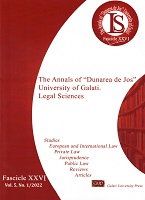The Immovable Character of the Decalogue – Theological and Legal Arguments
The Immovable Character of the Decalogue – Theological and Legal Arguments
Author(s): Mihaela-Corina BucurSubject(s): Christian Theology and Religion, Philosophy of Law, Canon Law / Church Law, Sociology of Law
Published by: Galaţi University Press
Keywords: Moral Law; ceremonial law; temporary character; permanent character;
Summary/Abstract: Scripture regulates several types of laws, some of which were temporary, limited in time and space, and others of a permanent nature. The temporary laws are ceremonial, judicial, administrative, social or civil, financial, family, operating or agricultural laws, laws for rulers and laws for foreigners, and permanent laws are the Sanitary and Moral Law or the Decalogue, which includes the mandatory requirements for all people in all times. The rites of the ceremonial law pointed to the Savior’s sacrifice. At the Cross, where the type (the lamb as a symbol) met the antitype (the fulfillment of the symbol - the Lamb of God), this law ceased to be valid. At the same time, God Himself transmitted through Moses the Ten Commandments. According to the texts of Scripture, the Moral Law reflects the character of God, being: good, holy, perfect, pure, just, true, spiritual, righteous, faithful, unchanging, eternal and reflecting love. The purpose of these commandments is to guide a happy life lived in abundance, not to show the difference between good and evil, and not to protect from dangers and tragedies. The first four commandments, regarding the human-divinity relationship, find the correspondent in constitutional law, with the amendment that the Decalogue strictly aims at the connection with God in the monotheistic Christian religion, while the Constitution guarantees religious freedom, regardless of the practiced religion. The next six commandments concern relationships between people: the fifth available commandment finds application in family law, and the sixth up to the ninth commandment inclusive, containing imperative norms – in criminal law. The tenth commandment, however, transcends the material framework, addressing the thoughts, senses, and soul, thus a preventive character against the acts of a criminal nature, the character that does not allow the rules of law to take it as such, but accepts it. Thus, the Decalogue constitutes a system of rules to be observed that would ensure a minimum of stability, of normality of relations, within any society, regardless of time, space, or conditions.
Journal: The Annals of ”Dunarea de Jos” University of Galati. Legal Sciences. Fascicle XXVI
- Issue Year: 6/2023
- Issue No: 1
- Page Range: 166-176
- Page Count: 11
- Language: English

